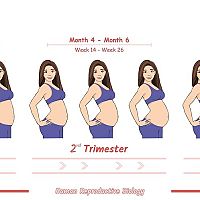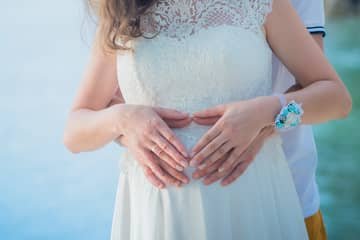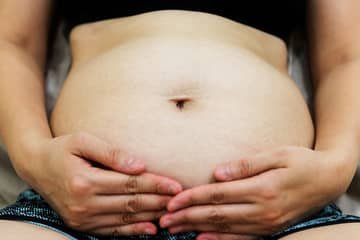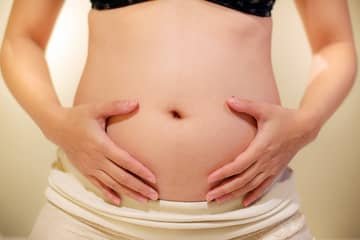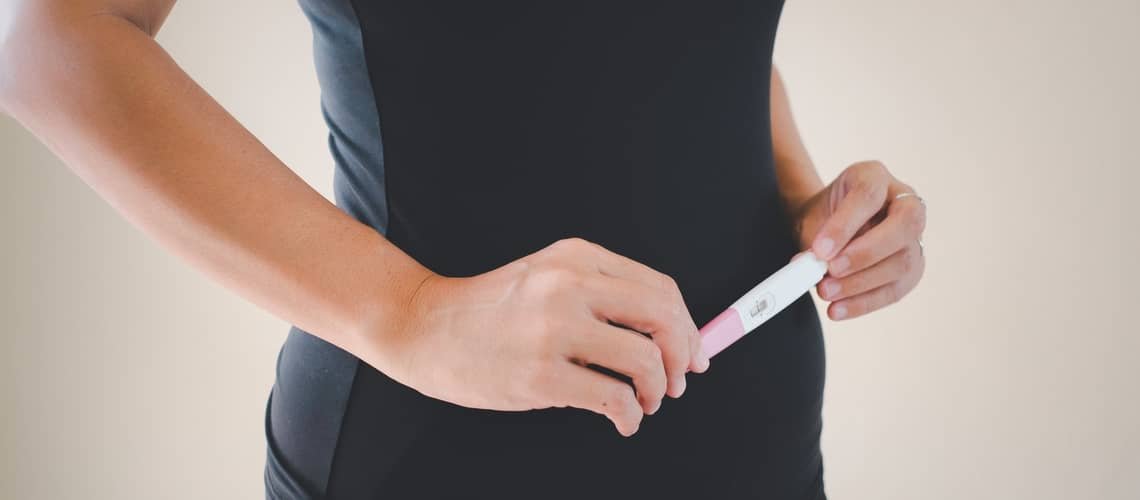
2nd week of pregnancy - symptoms, belly, size of fetus. Go for an ultrasound?
As a follow-up to the 1st week of pregnancy, it is still true that even in this period one cannot talk about pregnancy as such. The woman is still not pregnant. During this period, women's menstruation (menstrual bleeding) usually ends and the window of fertility begins, which includes ovulation itself. It is during ovulation that the egg can be fertilized by a man's sperm. Despite the fact that the 2nd week of pregnancy will be retroactively entered in the pregnancy book - diary, the woman's pregnancy is not actually present yet. However, the body of a healthy woman undergoes changes that maximize the chance of pregnancy, which is also confirmed by increased hormonal activity. The processes that take place in the female body are a prerequisite for pregnancy to occur. What specifics does the 2nd week of "pregnancy" bring?
As with the 1st week, the 2nd week of a woman's pregnancy is determined retrospectively by the doctor-gynecologist. This is because in this term the pregnancy is not actually taking place yet. The doctor is based on a methodology in which the first day of pregnancy is the first day of the last menstrual period. In the 2nd week of pregnancy, a woman's cycle passes into the most important phase, in which ovulation occurs. Now the dominant egg of the woman and the sperm of the man can fuse. In principle, this means that partners should try hard to conceive during this period.
2nd week of pregnancy – ovulation
In this phase, the body continues to prepare for the most important part of the menstrual cycle, ovulation, during which there is the highest probability that the egg will be fertilized by sperm, the process of migration and subsequent implantation of the fertilized egg in the uterus will begin. During the first week, the uterus prepares the environment itself for a potentially fertilized egg (menstruation is in progress - the 1st phase of the menstrual cycle).
In the second week, the follicular phase of the menstrual cycle (2nd phase) takes place, during which the lining of the uterus enlarges and the follicles with eggs in the ovary mature (note: during one cycle, follicles usually mature in only one, right or left ovary, and subsequently in the next cycle the ovaries alternate). Hormones are to blame for everything (FSH – follicle stimulating hormone, estrogen, LH – luteinizing hormone). A follicle is a kind of envelope with liquid in which the egg matures. The climax of this phase is approximately the 14th day of the cycle, when the follicle bursts and the egg is thus released into the fallopian tube, where it can meet the male's dominant sperm and its fertilization can occur. However, the lifespan of an egg is only 12 to 24 hours (note, according to some sources up to 48 hours), which is a relatively short time during which it can be fertilized by the most fertile sperm.
In most cases, women only ovulate once during one menstrual cycle. However, there are exceptions when, for example, two ovulations can occur within a cycle. The second ovulation usually occurs mostly 48 hours after the first. In such a case, the chance of a twin pregnancy increases if the expelled eggs are fertilized by two sperm.
Fertile days and fertilization
Experts recommend that if a woman plans to become pregnant, it is advisable to plan intercourse during fertile days. Ideally, therefore, during the period of ovulation. The most fertile days are considered to be approximately the middle of the cycle. It is therefore ideal to plan sexual intercourse approximately 4 days before the expected ovulation to 1 day after the ovulation phase (note the 10th to 15th day of the cycle). During this period, there is the highest probability of pregnancy during unprotected sexual intercourse. A man's sperm can survive in a woman's body for up to 72 hours, some modern studies say even up to 5 days.
Of course, the day of ovulation determined by the middle of the cycle is not precisely determined for every woman. Every woman's body is individual, and the cycle itself also has specifics. For example, if you have an irregular menstrual cycle, have sexual intercourse more often, e.g. between days 10-18. This significantly increases the chance that the sperm will remain in the woman's body during the ovulation phase and fertilize the egg. During ovulation, a woman's body produces thicker mucus (so-called mucus), the consistency of which changes during ovulation. It is this mucus that helps sperm to survive and ensures their better movement.
A fertilized egg is called a zygote. After it has been fertilized by sperm, the process of migration through the fallopian tubes to the uterus begins. This migration phase lasts approximately 7 days, with definitive nesting occurring on average on the 13th to 14th day after fertilization. Shortly after fertilization, the egg splits into two and copies its DNA (23 chromosomes from the mother and 23 chromosomes from the father). A blastomere with 8 cells is formed, then it divides again and 16 cells are formed. The next division creates a trophoblast, from which the placenta divides and then the morula, which has 64 cells. It gradually turns into a blastocyst, which has a separate outer layer and inner content. It is the blastocyst that comes to the lining of the uterus and the implantation itself begins.
How do I know when I'm ovulating?
Ovulation in a woman occurs approximately in the middle of a regular 28-day menstrual cycle. A woman should know her own body, cycle and its symptoms. During ovulation, a woman can observe certain changes on her body. Medical practice shows that even if a woman has a regular cycle, she can ovulate on a different day in each cycle. On average, however, it will be around the middle of the cycle. In general, a woman ovulates most often on the 12th to 16th day of the cycle.
A woman can observe certain symptoms on her body during ovulation. Increased production of vaginal mucus (so-called mucus) is typical. Mucus is formed in the cervix. Before ovulation, it is liquid, sticky and colorless. Closer to the peak of ovulation, it has a consistency reminiscent of egg white, thickens and facilitates the sperm's journey to the egg. Its volume increases towards the peak of fertility. A small percentage of women experience mild spotting. There is breast pain, sensitive nipples, an increase in sexual libido, the sense of smell is more sensitive, and there is also local pain in the lower abdomen, usually on one side (in the ovary). Ovulation tests, which you can buy at a pharmacy, can be helpful for detecting ovulation.
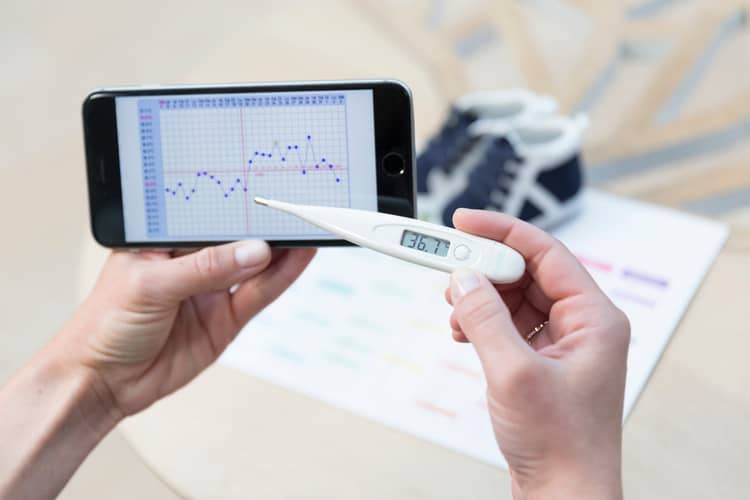
2nd week of pregnancy - symptoms
Do not expect any first signs of pregnancy at this time. Even taking a pregnancy test will not give you any relevant answer during this period. So, if there was a successful fertilization, the egg successfully traveled to the uterus, implanted, pregnancy hormones gradually accumulate in the body. Around the 3rd-4th week of pregnancy, it may happen that the next period does not come and it is possible to try a pregnancy test, which can show a positive result due to the level of pregnancy hormones (hCG) and thus (unofficially) confirm your pregnancy. Subsequently, other pregnancy symptoms become the topic.
The most frequent questions - FAQ
Do you know what happens to your body during this period? Despite the fact that the woman is practically not yet pregnant in the 2nd week, the most important processes are taking place that lead to successful fertilization. The 2nd week of pregnancy is determined by the doctor retroactively. It is important to know that the female body is preparing for fertilization during this period. If this happens and the fertilization is successful, the fertilized egg implants in the uterus and only then can it be stated that the pregnancy is in progress. Do you have any questions or interesting insights or observations ? Share your experiences and opinions and help other women and mothers. Join the discussion under the article.
What does the belly look like in the 2nd week of pregnancy?
Is it appropriate to go for an ultrasound in the 2nd week of pregnancy?
When should I have intercourse when I want to get pregnant?
Gallery
Pridať komentár



